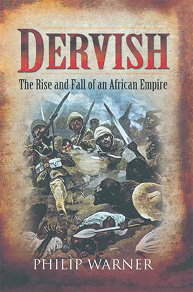E-bok
Dervish
Dervish is the vivid and colourful story of one of the more remarkable episodes in the ‘high Empire’ period of British history. The Mahdi’s rising in the Sudan in the 1880s starting as a localized Holy War against the ‘decadent’ Turkish/Egyptian overlords, engulfed a million square miles of arid territory and forced the British Liberal Government to get involved after the early disasters of the Hicks expedition and Gordon’s death at Khartoum.
The narrative, which makes excellent use of the first-hand diaries and reports, including those of Rider Haggard’s brother Andrew and of Father Ohrwalder (the Austrian missionary who spent ten years of captivity in the Mahdi’s camp), brilliantly describes the growth and strength of the Mahdist movement and the extraordinary devotion and discipline of the Dervish troops. Facing such opponents with stoic endurance were the British, Egyptian and Sudanese Negro soldiers, and the resulting military engagements evoked amazing feats of courage and derring-do on both sides.
The Dervish Empire outlasted the Mahdi by thirteen years. It ended in the battle of Omdurman and Kitchener’s reconquest of the Sudan, which was well supported by Reginald Wingate’s military intelligence operations. It lasted a comparatively brief span of time, but it had been established at the expense not only of the neighbouring Abyssinians but also of the European white man, at a time when Britain was approaching the zenith of its imperial power.
Philip Warner is author of Passchendale and The Zeebrugge Raid and numerous other first rate histories. He wrote the biographies of Auchinleck and Horrocks. He was the military obituary writer of The Daily Telegraph for many years. In WW2 he was a POW of the Japanese for 1,000 days. He died in 2000.
The narrative, which makes excellent use of the first-hand diaries and reports, including those of Rider Haggard’s brother Andrew and of Father Ohrwalder (the Austrian missionary who spent ten years of captivity in the Mahdi’s camp), brilliantly describes the growth and strength of the Mahdist movement and the extraordinary devotion and discipline of the Dervish troops. Facing such opponents with stoic endurance were the British, Egyptian and Sudanese Negro soldiers, and the resulting military engagements evoked amazing feats of courage and derring-do on both sides.
The Dervish Empire outlasted the Mahdi by thirteen years. It ended in the battle of Omdurman and Kitchener’s reconquest of the Sudan, which was well supported by Reginald Wingate’s military intelligence operations. It lasted a comparatively brief span of time, but it had been established at the expense not only of the neighbouring Abyssinians but also of the European white man, at a time when Britain was approaching the zenith of its imperial power.
Philip Warner is author of Passchendale and The Zeebrugge Raid and numerous other first rate histories. He wrote the biographies of Auchinleck and Horrocks. He was the military obituary writer of The Daily Telegraph for many years. In WW2 he was a POW of the Japanese for 1,000 days. He died in 2000.
Logga in för att låna
Information
Stöds av följande plattformar
PC/Mac
Surfplatta Läsplatta
Smartphone

